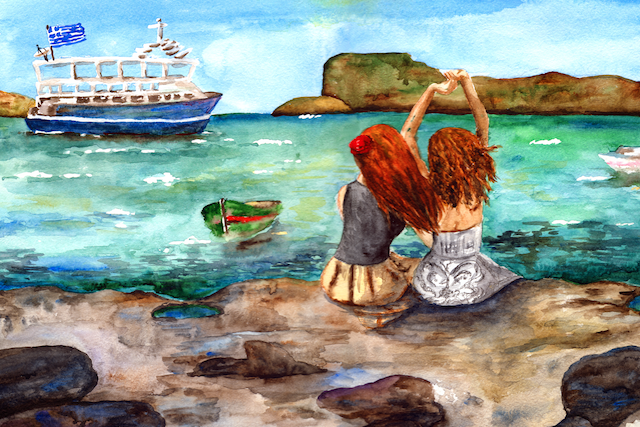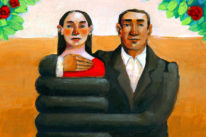
“Lots of people want to ride with you in the limo, but what you want is someone who will take the bus with you when the limo breaks down.” ~Oprah Winfrey
“How on earth am I supposed to survive? I have no friends whatsoever!”
These were the thoughts that ran through my mind then when I first set foot in London five years ago. I felt raw and vulnerable in the beautiful new city that I had to make my new home, alone, with my two kids, while my husband was overseas. I wondered how I was supposed to do it all.
Well, I had J, a friend I’d met on my honeymoon in Bali, but we had only kept in touch occasionally, so I didn’t expect much from her. I couldn’t really call her my friend, maybe a pleasant acquaintance, but surprisingly she turned out to be my much-needed rock-solid support system and guardian angel.
Every Saturday after work, she came over to my place, and we hung out. Sometimes we would walk to the park. Other times she would encourage me to drive (something I resisted). She visited my daughter when she fell and was in a cast and made my four-year-old daughter’s birthday memorable. She even helped me put up my garden table and chair. To say that I was grateful for her kindness would be an understatement.
I was grateful—one, because the help and friendship she offered was unexpected. Secondly, because she did it with a great and open heart. And lastly, because she accepted me for who I was and what I could offer at that point.
For the first time in my life, I was a ‘receiver’ in a friendship. Until then, I was always the giver.
But with J, things were different. Her generosity touched me so much, so I thanked her often and told her how much I truly appreciated the trouble she took. But she always shrugged it off. One day as I was thanking her for the millionth time, she said, “Lana, the friendship goes both ways. I too appreciate hanging out with you and your little kids. They add a lot of joy to my life also!”
She then proceeded to tell me that she lost two of her friends to cancer in the last few years, and the sudden losses left her feeling devastated. She said spending time with us helped her through that. I was shocked to hear it but was also pleased to know that my kids and I could fill that void for her in our imperfect selves.
Her honesty and generosity taught me some essential lessons on friendship and helped me differentiate between a healthy and unhealthy one. So, let’s unpack them.
The Tell-Tale Signs of Healthy Friendship
1. There is an equal amount of give and take in the relationship. Both people’s needs are considered essential, and the friendship doesn’t feel lopsided.
2. You’re both honest and transparent with each other. When J honestly opened up to me, it cemented our friendship because it made me feel equally important. Till then, I thought I was the vulnerable person in need of her, and I was surprised to know that she needed me as well.
3. You’re both kind and compassionate, and you completely accept each other. Whenever J arrived, she was always considerate of how overwhelmed I was. She was happy to have an overwhelmed, scared, and disoriented friend and accepted me for who I was.
4. Good friends don’t try to control, dictate, or tell you how to live your life. Though I was new to many things, she didn’t try to control me. She offered suggestions and sometimes pushed me out of my comfort zone but never crossed any boundaries. She gave me the space I needed.
5. Good friends are generous—with their time, resources, or whatever they have to give. J was generous with her time and company and took me to various places. I was happy to have another adult with me as I visited new locations with my girls.
6. Good friends appreciate each other and don’t try to take advantage of each other’s vulnerabilities.
7. Good friends don’t try to manipulate the other for personal gain. They may help each other, but they don’t use each other. They spend time together because they care for each other and enjoy each other’s company, not because they want something from each other.
Whenever there is an equal amount of give-and-take in a relationship, honesty, respect, and empathy for one another, you can be sure it is a keeper.
Through J, I learned that friendship is a two-way street. Before that, I had no standards and welcomed anyone and everyone in my life as friends. Even the ones who walked all over me and took advantage. J upped the bar for me.
So, what are the signs of an unhealthy friendship?
1. It feels one-sided. The other person dominates the friendship and prioritizes their needs and wants over yours.
2. They’re insensitive to your needs—they don’t consider them essential, or they trivialize them as unnecessary, either by joking or making your needs sound insignificant.
3. They subtly undermine you, implying that you aren’t good enough, can’t do what you want to do, or shouldn’t bother pursuing your wants, needs, and interests.
4. They see you as a means to an end, meaning you are useful for some specific purpose. Maybe you can help them move forward with their career, or you’re a bridge to connecting with someone else.
5. They do not respect you—they ignore your boundaries, talk to you in a condescending tone, and/or treat you like you’re not a priority.
6. They don’t respect or appreciate your time or effort.
7. They’re demanding and think everything rotates around them.
8. They have numerous issues that they can never sort out on their own. They never ask about you; you’re only there to listen to their problems and service their needs.
9. They’re always competing with you, and everything is a game where they want to be the winner.
10. They don’t want to know about you—your past, your feelings, or your interests.
11. They repeatedly bail on you unexpectedly, as if they don’t value your time together.
Walter Winchell says that “A real friend is one who walks in when the rest of the world walks out.” Here’s hoping you find that real friend who understands you, lifts you, and brings out the best in you!
About Lana Goes
Lana is a finance professional, writer, and book lover. She loves to inspire people to live life on their own terms. She believes in the art of journaling and that journaling is a skill everyone should learn, as it helps with self-awareness and self-discovery. Her course 'Journaling with Intention' includes journaling practices to help you clarify your vision, navigate through stuck areas, and create the life that you want. You can find some of her written work on Medium, Quora, her personal blog.
- Web |
- More Posts













 Though I run this site, it is not mine. It's ours. It's not about me. It's about us. Your stories and your wisdom are just as meaningful as mine.
Though I run this site, it is not mine. It's ours. It's not about me. It's about us. Your stories and your wisdom are just as meaningful as mine.
This post couldn’t have come at a better time. Thank you. Your post is a real wake up call.
I escorted a blind friend of mine to his COVID 19 vaccination recently. I managed to get us both vaccinated on the same day, but three hours apart.
Two subway trains, pouring down rain and wind, and I navigated my friend to the center. I also booked our vaccination and made sure our paperwork was in order.
I got my jab first. There was enough time between appointments so my friend and I could have a leisurely lunch.
I managed to navigate my friend to a pleasant nearby cafe for lunch. After we got settled at our table, the waitress came to take our order.
First words out of my friend’s mouth: “We’ll have separate checks, please.”
If ever I’m in that situation, I hope there will be someone there for me. I promise. Lunch and my sincere appreciation are on me.